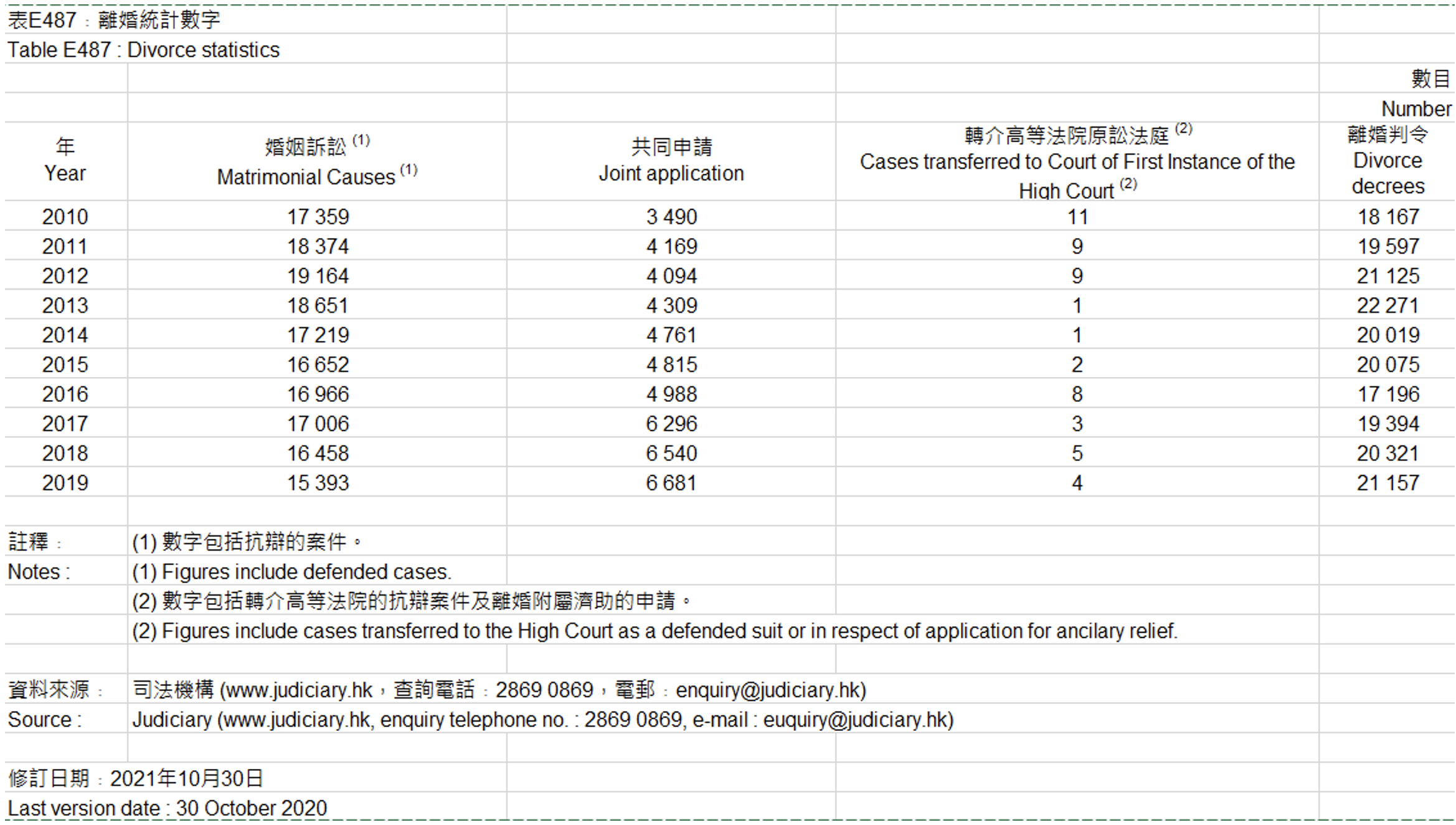Number of divorce cases has been rising year by year in Hong Kong. In Hong Kong, you may get married at a marriage registry by a Registrar; or in a licensed place of worship by a competent minister or at any other place in Hong Kong by a civil celebrant of marriages. However, marriage can only be dissolved by a Decree of the Family Court of Hong Kong. If you anticipate a divorce, to safeguard your own interest and that of your children (if any), you should get to understand the legal procedures of a divorce.
This article aims to provide you an idea about the requirements and grounds for filing a divorce suit with the Family Court, the relevant stages of a divorce suit, as well as the importance of engaging with a lawyer during this process.

In comparison with the years between 2017 to 2019, the numbers of matrimonial causes showed a slightly downward trend whereas the numbers of joint application increased gradually. The divorce decrees granted from the Court keep increasing among these years.
Extract from Census and Statistics Department, HKSAR
https://www.censtatd.gov.hk/en/EIndexbySubject.html?pcode=D5600487&scode=160
What are the requirements for Hong Kong Family Court to deal with your divorce?
The jurisdiction of Hong Kong Family Court to deal with a divorce does not depend on whether the marriage was registered in Hong Kong. As stated in section 3 of the Matrimonial Causes Ordinance (Cap. 179), Hong Kong Court shall have jurisdiction in proceedings for divorce if, either of the parties to the marriage (a) was domiciled in Hong Kong at the date of the divorce petition, or (b) was habitually resident in Hong Kong throughout a period of 3 years immediately preceding the date of the divorce petition, or (c) had a substantial connection with Hong Kong at the date of the divorce petition.
Regarding Requirement (a) “domicile”, you may not simply be regarded as “domiciled” in Hong Kong even if you hold a Hong Kong Identity Card.1 The requirements are set out in section 5 of the Domicile Ordinance (Cap.596). In W v C2, the Court held that an individual retained the domicile he had immediately before he became an adult unless it could be proved that he acquired a new domicile in a country or territory if: (a) he was present there; and (b) he intended to make a home there for an indefinite period. Concerning Requirement (b) “habitual resident”, Ikimi v Ikimi3 establishes that a party could be habitually resident in various nations at the same time, which is different from domicile. The legal principle was then followed and confirmed in ZC v CN4, where the Court states that if an individual has willingly agreed to settle and live in that specific country on a continuous basis, it will be deemed as his or her habitually residential area, even if another region has been classified as such contemporaneously. Requirement (c) “substantial connection” is also clarified by ZC v CN5 in that to determine whether there is a sufficient “substantial connection” with Hong Kong at the date of the Divorce Petition, several elements have to be examined together. These include the residential status of the individual and his or her families, the reason for the individual’s presence in Hong Kong, the past records of the individual’s visits and his or her working experiences in Hong Kong, the total amount of assets retained by the individual in Hong Kong, and so on.
In short, Hong Kong Family Court has jurisdiction to deal with the divorce if one of the parties to the marriage is able to satisfy one of the 3 requirements set out above.
Further, section 12 of the Matrimonial Causes Ordinance (Cap.179), provides that except for phenomenal circumstances (such as exceptional hardship suffered by the applicant spouse or exceptional depravity on the part of the respondent spouse), no Divorce Petitions shall be allowed to be presented where the marriage has lasted less than one year.
What are the grounds for filing a Divorce Petition?
The sole ground for presenting or making a petition or application for divorce shall be that the marriage has broken down irretrievably and proceedings for divorce shall be instituted either by a Petition for Divorce; or by an application for divorce.
The court hearing a petition for divorce shall not hold the marriage to have broken down irretrievably unless the petitioner satisfies the court of one or more of the following facts —
- that the respondent has committed adultery and the petitioner finds it intolerable to live with the respondent;
- that the respondent has behaved in such a way that the petitioner cannot reasonably be expected to live with the respondent;
- that the parties to the marriage have lived apart for a continuous period of at least 1 year immediately preceding the presentation of the petition and the respondent consents to a decree’s being granted;
- that the parties to the marriage have lived apart for a continuous period of at least 2 years immediately preceding the presentation of the petition; and
- that the respondent has deserted the petitioner for a continuous period of at least 1 year immediately preceding the presentation of the petition.
What are the key procedures for a Divorce Petition?
1. Filing Divorce Petition
To start the divorce proceedings, a party to the marriage may present and file a Petition together with statutory forms with the Family Court.
2. Informing your Spouse
After a Divorce Petition has been filed with the Family Court , a Petitioner (i.e. the party who initiates the divorce proceedings) must notify his or her spouse (“Respondent”) by serving the Petition to the Respondent personally or by post through a lawyer or a third party. It is prohibited that service of the Divorce Petition be personally effected between spouse.
If the Respondent cannot be located rendering service of the Divorce Petition not possible, application for directions of the Court for substituted service of the Petition may be required.
Upon being served with the Divorce Petition, within 8 days, the Respondent has to file with the Family Court a Notice of Intention to Defend (Form 4), which is a form attached to the Divorce Petition so served, acknowledging of service of the Petition and indicating whether he/she wish defend the Petition.
3. Setting down cause for Trial
If the Respondent wishes to defend the Petition or to dispute any of the facts alleged in it, he/she may file an Answer to the Petition within 21 days after the expiration of the time limited for Form 4. The Court will give further directions as such filing of pleadings, discovery of documents and affidavits from witness etc. When all the papers and evidence are ready for trial, the Court will set the cause down the Defended List for trial before a Judge without jury during which witness(es) for the parties will be testified orally.
If the Petition is not contested, the Petitioner may apply for directions for trial of a divorce cause and the Registrar shall give directions for trial by entering the cause in a list to be known as the special procedure list.
4. Granting Decree Nisi and Decree Absolute
In respect of the causes on the special procedure list, the Court will consider the evidence filed by the Petitioner and if he is satisfied that the Petitioner has sufficiently proved the contents of the Petition, the Court will pronounce a Decree Nisi provisionally dissolving the marriage without the attendance of parties at the hearing. For the defended cases, after trial, the Court will either grant a Decree Nisi or will dismiss the Petition if insufficient evidence is found.
After six weeks of grating the Decree Nisi, the Petitioner may apply for a Decree Absolute to dissolve the marriage formally.
If there are children of the marriage, the Court has a duty to consider the arrangements for their welfare. The Decree Nisi will not be made absolute until the Court is satisfied with the arrangements for them.
Should I engage a lawyer?
While it is not compulsory for parties to be legally represented in divorce proceedings, as illustrated above, divorce suit involves complicated and technical procedure. It is in your best interest to seek legal advice to understand your position and to have a legal professional to handle the procedures, especially when your spouse does not agree to a divorce or to the arrangement of children or even the arrangement of the family assets.
A Short Summary of the Benefits of Engaging with a Lawyer Include:-
- Providing professional support at the difficult moment in your life and answering your concerns
- Giving advice on your legal position in the divorce including the issue of custody of family children and financial distribution
- Handling and proceeding the matter in a more efficient and smooth manner
- Alleviating tension between the parties especially when the parties are no longer able to have sensible dialogue
- Facilitating parties’ negotiation and mediation
Conclusion
It is a myth that divorce in Hong Kong is a simple process. Divorce proceedings can be even more complicated if it involves jurisdictional challenge or parallel divorce proceedings due to cross border marriage. Further, divorcing with a high net worth individual may also involve substantive disputes on distribution of family assets.
If you have an issue in your marriage and wish to seek legal assistance, please contact our family lawyers to understand more. Your case will be handled by our professional with sensitivity and expertise.
 |
Partner E-mail:vivianwong@wktoco.com
|




